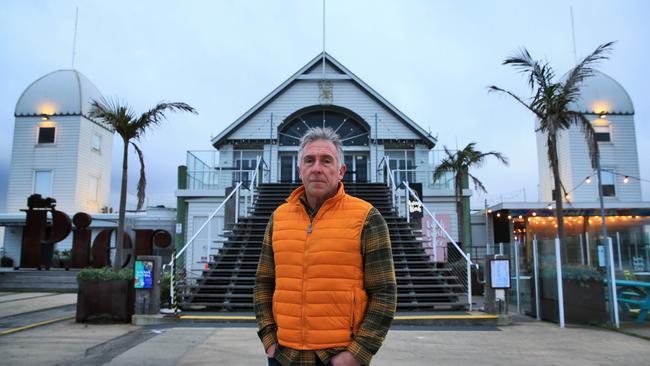Insolvency surge if support ends as hospitality industry feels pinch
Almost one in two business owners say without JobKeeper they’d be doomed, as cuts loom to the $1500 per-employee economic support.

Hospitality fear cuts to JobKeeper slated for the end of September and the beginning of next year may plunge their businesses into crisis, with almost half of operators reporting they would have collapsed without the subsidy.
Darren Holroyd, owner of function centre The Pier and adjoining restaurants Wah Wah Gee and Wah Bah at Cunningham Pier in Geelong, has 35 part-time and casual workers who he managed to keep employed through JobKeeper.
“We were fortunate with being able to keep most of them on the JobKeeper,” Mr Holroyd said, adding that the second wave of coronavirus in Victoria made the wage subsidy a saving grace for his business.
“A few weeks ago, I would have felt that we might have limped through without the JobKeeper but now it looks like restrictions will continue for another couple of months, I don’t think we could have sustained that.”
This comes as cases in Victoria jumped 532 on Monday to 4,542.
Geelong recorded one new case for the day, adding to the city’s active tally of 31.
Mr Holroyd said he might be able to handle the decreasing rate of JobKeeper — if Victoria lifts its dining-in limit from 20 people to 50.
“This will force us to pay people on top of the JobKeeper. It’s going to make life more difficult. How difficult, it’s very hard to tell,” he said.
“We’d have to be turning over enough money to top it up ourselves. At the end of the day, there’s just a certain amount of hours you need covered every week.”
Data from Deliveroo’s Future of Food Survey seen shows that 44 per cent of 504 surveyed hospitality businesses said they would not have been able to continue trading without the $1500-a-fortnight wage subsidy.
But with the subsidy rate for full-time workers falling to $1200 a fortnight in September and the rate for part-time workers falling to $750 before being halved again in January, employers are worried they might not be generating enough cashflow to cover their wages bill.
Analysts are also concerned that as JobKeeper tapers off and then expires in March, businesses will be forced into bankruptcy.
Research from IBISWorld shows the accommodation and food sector is among the most vulnerable, with 55 per cent of the sector’s businesses currently receiving government support and almost 45 per cent having less than three months’ operating cash on hand.
“While JobKeeper has provided support to businesses that would be thriving in a world without COVID-19, it has also propped up businesses that would have otherwise failed by now under normal operating conditions,” said IBISWorld senior industry analyst Matthew Barry.
“Since the first JobKeeper payment in May 2020, the number of businesses entering external administration has declined by approximately 45 per cent year on year. Once JobKeeper is removed, the number of businesses entering external administration is likely to spike.”
Changes brought in during the early days of the pandemic have masked the true extent of insolvencies across the hospitality sector, but signs from credit reporting business Creditor Watch show overdue payments to suppliers across the hospitality industry in July were more than twice as late as they were last year.
At the height of the lockdown in May payments were on average 57 days late, which has since retreated, according to Creditor Watch data.
CEO Patrick Coghlan said as payment times across the industry blew out so did the risk to business.
“Payment times blowing out is the leading indicator of delinquency and it’s the first sign we see when a debtor is heading toward administration,” he said.
“We know it’s only a matter of time before this industry will see an influx of administration, that’s the big danger.”
He said the risk of a wave of restaurants closing, owing debts to thousands to suppliers, would only grow as support from the government was withdrawn.
“Where there’ll be a big effect is that previously a part timer was getting $1500 now they’ll only get $650, and the hospitality industry has a huge number of part-timers.”
Deliveroo data shows many businesses were confident prior to COVID-19, with 70 per cent reporting they were considering expanding before the pandemic hit.
However, 28 per cent now report they were pessimistic about their futures, while another 20 per cent had no idea what was in store.
The lingering impacts of the coronavirus pandemic will also impact businesses that managed to push through without receiving a subsidy.
Small business owner Anna Jo, who runs Sushi Kotobuki in east Brisbane and Izakaya Kotobuki in the Brisbane CBD, managed to make it to the other side of the pandemic without JobKeeper or laying off a single worker.
But with most of her employees students on working holiday visas from Japan, she’ll struggle to find new staff as they return home and new workers are prevented from entering Australia because of the travel ban.
“We will have to consider Australian residents, we will have to hire more Australian residents because the border is not opening,” she said.
“I have hired Australians before and there is a language barrier between them and the other employees, and we need to explain how to cook the food because it’s different from the western style.
“It’s difficult, but I will try hard.”



To join the conversation, please log in. Don't have an account? Register
Join the conversation, you are commenting as Logout